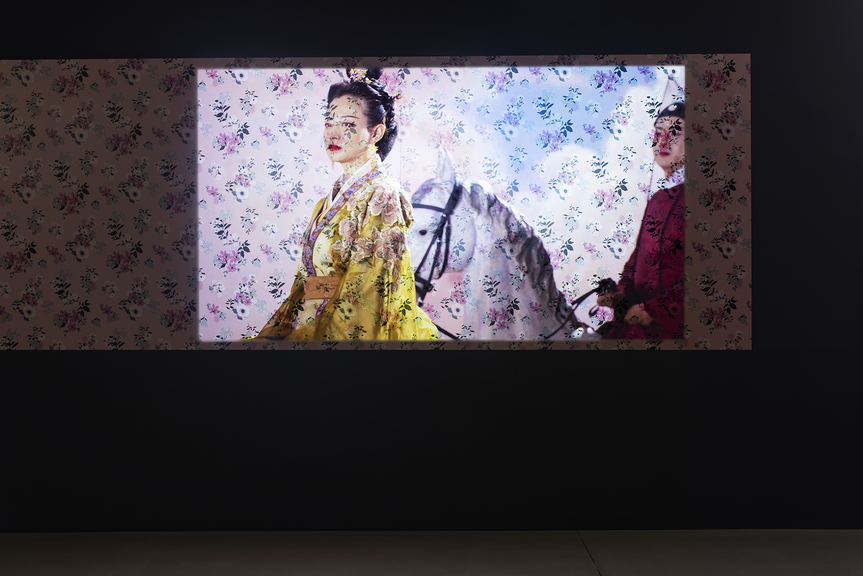-
From Current Issue
-
- Editor’s Letter Fire in the Heart
- Reviews I Gusti Ayu Kadek Murniasih
- Reviews 11th Seoul Mediacity Biennale: “One Escape at a Time”
- Dispatch Networked China
- One on One Monira Al Qadiri on Yukio Mishima
- Essays The rise of independent art spaces in pandemic-era Shanghai
- Features Tuan Andrew Nguyen
- Table of Contents
- Web Exclusives
- Archive
- Subscribe

R
E
V N
E
X
T
Installation view of YANG FUDONG’s “Beyond GOD and Evil – Preface,” at Marian Goodman Gallery, London, 2019. Photo by Thierry Bal. Courtesy the artist and Marian Goodman Gallery.
Entering Marian Goodman Gallery’s London space to view Yang Fudong’s solo exhibition, I was stopped short by a wire mesh fence erected just beyond the front desk, barring the way to the exhibition. Somewhat discombobulated, I asked the receptionist, “Is the show open?” It was; visitors were to walk through a gate set in the fence, and heavy black curtains. Beyond these partitions, finally, was the central exhibit, Dawn Breaking – A Museum Film Project, Dailies (2018), a 36-channel video installation shown on monitors and as projections dispersed throughout the darkened gallery.
The aberrant fence turned out to be replicas of the structures that were used to circumscribe film sets at Shanghai’s Long Museum, where this installation’s footage was shot. Such a mesh structure, obstructive yet transparent, is in fact a fitting metaphor for this project, which tests the porosity of the boundaries between artwork, art-making, and reality. Yang first thought of shooting a film in a museum in 2009; the concept was at last realized in 2018 at the Long Museum, as the Dawn Breaking project. After surveying the museum’s cavernous spaces of exposed concrete and soaring vaulted ceilings, Yang constructed film sets that transformed select areas into opulent scenes from the Song Dynasty imperial court. His crew filmed there for 36 days; during this time, museum visitors were invited to witness the crew in action, forming a dynamic where filmmaking doubled as an elaborate durational performance.
Each evening, the day’s footage was edited into a video, resulting in the 36 video diaries that comprise the installation shown in London. The videos present a world of luxury and power, taking viewers to a sweeping court hall with commanding columns, a spectacular landscape of weather-worn rock formations, a white-dusted pagoda in snowfall. Inhabiting these lush spaces are men donning the red court attire of Song Dynasty officials, and lithe women in ornately patterned robes. The characters spout aphoristic lines on joy, desire and power, delivered languidly with poetic rhythm. These are in fact Mandarin translations of Friedrich Nietzsche’s writing—alluded to in the exhibition’s titular pun on the philosopher’s polemic Beyond Good and Evil (1886)—which feels unexpectedly at home in Yang’s videos. The filmmaker has commented that these quotes represent to him “the narrative of human desires” embedded in social structures and from which social conflicts emerge, though Yang refrains from drawing out specific political or philosophical resonances between the Song Dynasty courts—where Confucian ethics dominated—and Nietzsche’s relativist stances on morality in the project.
Yang’s fictional world is instantly seductive, but its magic is just as quickly dispelled. In the videos, the illusionistic scenes are periodically interrupted by shots taken with the camera set further back to expose the surrounding set: crew loiter in the foreground of these shots, their black attire shadow-like against the brightly lit sets, among sound booms and director’s chairs that rupture the fictional veneer. Such a structuralist impulse has guided Yang’s previous film-based work, for instance Dawn Mist, Separation Faith (2009), a nine-channel film installation comprising various takes of the same scenes shot 20 to 30 times, centering the repetition of filmmaking as subject matter. Likewise, the Dawn Breaking diaries offer no overriding narrative, enforcing Yang’s aversion to the singular and linear.
Multiple moments also fuse together in the overpainted photographic prints presented in the upper-floor gallery. In each, stills or production photographs have been digitally sutured together and tinted scarlet, then overlaid with abstract and figural elements in red and white acrylic. The photomontage technique produces interesting spatial depth and logic within the print, reminiscent of the layered compositions of Chinese shanshui painting.
Reflecting on Yang’s project, I recalled the opening shot of Jean-Luc Godard’s film Le Mepris (1963), in which a camera operator is shown filming a tracking shot of an actress before directing his camera straight at the audience. Godard’s work makes a passionate subject of the complex relationship between art and life, which seems to be Yang’s preoccupation here. It feels apt that the latter’s project extends out from the museum, a place for the appreciation of artistic production, for central to the film is the actual work of filmmaking, and behind its nominal narrative is an homage to the art form itself.
Yang Fudong’s “Beyond GOD and Evil – Preface” is on view at Marian Goodman Gallery, London, until July 26, 2019.
To read more of ArtAsiaPacific’s articles, visit our Digital Library.




















